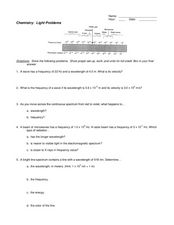Curated OER
Seas in Motion
Young scholars analyze wave movement. In this Science lesson, students use items that float to observe waves and currents. Young scholars record and discuss their observations.
Curated OER
Waves and Currents
Middle schoolers are introduced to the forces that are responsible for generating waves in the ocean and how these forcesf differ from those that cause currents. They are able to explain how water molecules in a wave do not move in the...
Curated OER
Sand Travels
Students examine how sand is formed by erosion and that it can be moved by streams, rivers, and ocean currents in this unit of lessons. They study waves and currents, and structures that change how sand moves by creating story charts,...
Curated OER
Behavior of Waves
Lots of definitions are given here, and your students will find the details and links useful, along with the diagrams and examples.
PBS
Measuring Waves | UNC-TV Science
Discover the secrets used by scientists to measure mechanical waves. Young physicists learn about measurable wave qualities—amplitude, wavelength, and frequency—by watching and listening to a video discussing longitudinal and transverse...
Mr. E. Science
Characteristics of Waves
Waves, waves, and more waves. Here, class members look at the many types and characteristics of energy waves including transverse, longitudinal, standing, seismic, p-waves, s-waves, and l-waves.
Curated OER
Two Source Interference
The paths of waves generated from two different points are shown here on a sequence of slides. The lengths and directions are labeled, step-by-step. Finally, path interference is shown along with the calculations that your physics...
Curated OER
Wavelengths of Light
Explore physical science by participating in a visual spectrum experiments. Budding scientists identify the colors in the color spectrum and view the colors in class by utilizing cellophane, flash lights, and other arts and crafts...
Curated OER
Electromagnetic Spectrum Worksheet
These six multiple-choice questions ask pupils to evaluate the energy, wavelength, and frequency of particular electromagnetic wavelengths. Further questions then require them to apply their knowledge and convert certain values or give...
Curated OER
The Photoelectric Effect
After some online instruction, chemistry aces use their creative abilities to produce a poster describing the photoelectric effect and one type of imaging technology that uses electromagnetic radiation. This simple, straightforward...
Curated OER
The Electromagnetic Radiation (Light ~ the Supreme Informant!)
This short slide show applies the electromagnetic spectrum to astronomy. First, electromagnetic radiation is introduced to viewers. Wavelength is defined and its unit of measurement explained. Finally, aspiring astronomers find that the...
Curated OER
Catch a Wave
Students study low tides and how to calculate for fresh water. In this ocean science lesson, students pretend they are stranded on an island and must calculate low tide in order to source the fresh water aquifer. Students calculate how...
Curated OER
Marine Fisheries Management
Almost 200 slides make this a vast collection! It is a quirky collection, titled "Marine Fisheries Management," but having little to do with that occupation. What you will find are two-toned blue backgrounds with no pictures, but a few...
Curated OER
Light Problems
In this light worksheet, students describe the electromagnetic spectrum based on wavelength and frequency. Students determine the wavelength, frequency, and energy for given point on the spectrum. This worksheet has 10 problems to solve.
Curated OER
The Photoelectric Effect
A single-page learning exercise describes the photoelectric effect of metals exposed to light. The kinetic energy equation is given, and physicists learn how to use it for problem solving. Compact in content, this can be used as a...
Curated OER
Gallery Walk Questions on Earth's Radiation Balance
Questions that can be used in a instructional activity on Earth's radiation balance are suggested in this resource. It is not a lesson plan, per se, but it is a list of questions for stations within a "Gallery Walk" instructional...
Curated OER
What Wavelength Was That?
A combination of informative text, photos, and graphics comprise this sharp show on electromagnetic radiation. Some slides mention hands-on activities for demonstrating concepts, so if you want to include them you will need to figure out...
Curated OER
Ocean Waves and Tides
Except for a few blurry photos that you can leave out, this is a succinct, yet purposeful presentation. It explains what causes ocean waves, the parts of a wave, and how they break against a shore. It details the cause of tides and...
Curated OER
Catch a Wave. . .
Part of a larger online space science website, this page has a brief explanation of electromagnetic radiation and a chart of wavelengths as compared to common objects. There are four questions to answer about the information. This can be...
Curated OER
Now You See Me, Now You Don't
Bioluminescence fascinates most upper elementary scientists. Display images of different glowing deep-sea organisms and discuss their environment. Young biologists then experiment with images and different colors of filtered light. In...
Curated OER
Marine Biology - The Story of Waves
When teaching about the movement of water in the ocean, this PowerPoint will be a terrific support. It covers how waves break and how they are generated. The causes of tides and tsunamis are also detailed. A couple of changes could make...
Curated OER
Science Jeopardy
Water, currents, waves, salt marshes, and The Chesapeake Bay make up the categories for this Jeopardy-style game. In terms of functionality, it works well. However, it is unlikely that you focus on the Chesapeake Bay as part of your...
Curated OER
Understanding Waves
Learners examine the physical properties of waves to explore the word crest and trough. They use toys to study waves in air, water and light.
Curated OER
Checking the Surf
Students read and discuss waves and their wavelengths and amplitudes. In this waves lesson plan, students draw the wavelength and amplitude of a wave and discuss tsunamis and storms.

























